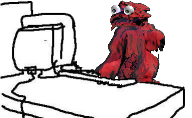- Joined
- Jan 28, 2011
- Messages
- 99,586















Tags: Colony Ship RPG; Iron Tower Studios; Vault Dweller
Vault Dweller has posted a new Colony Ship RPG update over at the Iron Tower forums. This one is about the game's party mechanics, which as you might expect, aim to be more grimly realistic than those of other RPGs. Vault Dweller explains, with lots of images from Spaghetti Westerns which I won't include here:
Vault Dweller has posted a new Colony Ship RPG update over at the Iron Tower forums. This one is about the game's party mechanics, which as you might expect, aim to be more grimly realistic than those of other RPGs. Vault Dweller explains, with lots of images from Spaghetti Westerns which I won't include here:
Design Goals
Typically, RPG party members serve a purely tactical role, giving your more bodies to control in combat and access to different combat abilities. In a sense, you’re role-playing an entire squad as outside of combat there is very little (if any) difference between the character you created and the characters you’ve recruited or created next.
It works great in RPGs that are mostly about combat, but calls for a different approach when it comes to non-combat gameplay. The main problem is that party members offer nothing but combat benefits (occasionally, freaky sex to relieve combat stress and party banter), giving you very few reasons to treat party members any differently than the main character.
In short, the problem is that in most RPGs party members are mindless zombies lacking any free will, agenda, goals, etc – the very qualities that separate an actual “character” from a zombie. Thus, our main design goal is to create proper characters that have a will of their own, as well as agendas, beliefs, goals, and other infuriating qualities.
No, it doesn’t mean the “gotcha!” design. It means that if you want to play a character that does things a certain way, you either run with a posse that has a very similar outlook on life (which doesn't always guarantee smooth sailing) or do your best to avoid pissing them off. Needless to say, if you’re a treacherous scum, don’t be surprised if your men take the lessons you teach them to heart. In other words, all unpleasantries caused by your party members should be the direct result of your own actions, aka dynamic reaction based on your choices in quests, conversations, reputation, and such.
To give you a very simple example, if you decide to double-cross a religious faction, don’t be surprised if a religious party member won’t stand for it. He might leave you, he might turn on you, he might join your enemies in a fight, etc. His exact decision won’t be random but will depend on a number of different factors.
Furthermore, don’t expect the party members to follow you anywhere for free, which might create tensions and personal dilemmas.
Last but not the least, party members aren’t immortal heroes. It will be possible and even easy to lose them if you insist on getting into every fight (think of saving Vardanis in AoD). You should even be able to lose an entire crew and come back alone, Flint-style, with all the proper consequences (fewer people would want to follow a suicidal maniac). Much like in AoD, not every fight will be winnable by ANY party at ANY point.
Mechanics
You control your party members' level-ups, but not their dialogue. I wonder if they'll attempt to autonomously use their own skills during dialogue. That'd be new.Typically, RPG party members serve a purely tactical role, giving your more bodies to control in combat and access to different combat abilities. In a sense, you’re role-playing an entire squad as outside of combat there is very little (if any) difference between the character you created and the characters you’ve recruited or created next.
It works great in RPGs that are mostly about combat, but calls for a different approach when it comes to non-combat gameplay. The main problem is that party members offer nothing but combat benefits (occasionally, freaky sex to relieve combat stress and party banter), giving you very few reasons to treat party members any differently than the main character.
In short, the problem is that in most RPGs party members are mindless zombies lacking any free will, agenda, goals, etc – the very qualities that separate an actual “character” from a zombie. Thus, our main design goal is to create proper characters that have a will of their own, as well as agendas, beliefs, goals, and other infuriating qualities.
No, it doesn’t mean the “gotcha!” design. It means that if you want to play a character that does things a certain way, you either run with a posse that has a very similar outlook on life (which doesn't always guarantee smooth sailing) or do your best to avoid pissing them off. Needless to say, if you’re a treacherous scum, don’t be surprised if your men take the lessons you teach them to heart. In other words, all unpleasantries caused by your party members should be the direct result of your own actions, aka dynamic reaction based on your choices in quests, conversations, reputation, and such.
To give you a very simple example, if you decide to double-cross a religious faction, don’t be surprised if a religious party member won’t stand for it. He might leave you, he might turn on you, he might join your enemies in a fight, etc. His exact decision won’t be random but will depend on a number of different factors.
Furthermore, don’t expect the party members to follow you anywhere for free, which might create tensions and personal dilemmas.
Last but not the least, party members aren’t immortal heroes. It will be possible and even easy to lose them if you insist on getting into every fight (think of saving Vardanis in AoD). You should even be able to lose an entire crew and come back alone, Flint-style, with all the proper consequences (fewer people would want to follow a suicidal maniac). Much like in AoD, not every fight will be winnable by ANY party at ANY point.
Mechanics
- Your Charisma determines how many people can follow you. So far the formula is: 1 follower at CHA4, 2 at 5, 3 at 7, 4 at 9.
- XP will be divided by the number of people in the party, so a smaller party will level up faster.
- Large pool of potential recruits, including mutants and a droid. The droid won’t require XP (more for you) and will be upgraded rather than leveled up (think Lore/Crafting plus parts you’ll need to scavenge).
- All party members will have unique feats the PC won’t have access to. They will have good stats and skills and will be created with the same love and affection you create your own character.
- In AoD the content was determined by your stats, questlines, and skills. In CSG party members will often have valuable in-game knowledge that would unlock certain places and extra quest solutions. Basically, 50% of gating will be outsourced to the party members.
- Your party members will be able to participate in conversations but you won’t control their lines. Think of letting Virgil to handle the conversation with the assassin near the crash site in Arcanum. Basically, you select a line for your PC to say or “let party member X handle it for you” (and hope for the best).
- You won’t be able to take equipped items from the party members, but you’ll be able to offer them proper replacements (i.e. no ‘disarm and dump’). Other than that you’ll have full control of party members in combat (if they object to your leadership, they will do it before combat starts) and when leveling up.
- Unlike the player’s character, the party members will have a complex personality & beliefs system that would determine their reaction. Most likely these stats will remain hidden from the player and you’d have to figure out what you’re dealing with by talking to them and observing how they act/react.
- Instead of going for AWSUM!!! characters with troubled past, we're going for a low-key gang of colorful characters.



















